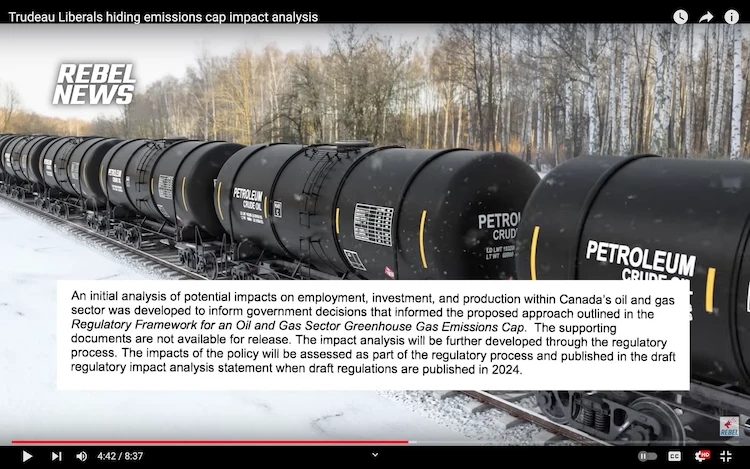Video: Trudeau Liberals hiding emissions cap impact analysis
Link: https://youtu.be/8YrBh2Jyxyw?si=M3V4kwBuKrE0GXa5
@skillsgaptrainer “In an illuminating juxtaposition of historical and contemporary narratives, we find a recurring theme that spans across different political and economic systems: the struggle against forces that seem to stifle the prosperity and potential of citizens and nations alike. This article delves into the intricate dynamics of such struggles, from the austerity measures of Nicolae Ceaușescu’s Romania to the modern-day provincial governments in Canada defending against global economic and policy pressures. Reflecting on history, Nicolae Ceaușescu’s Romania stands as a testament to a monumental yet controversial achievement: the repayment of its entire foreign debt by the late 1980s. This monumental feat was achieved at a tremendous cost. There were also decades of payments to the Soviets with the produce of the farmers — a fact often overshadowed and not really something Putin talks about too much when explaining his version of the supposedly civilized Russia. The austerity measures implemented to achieve the national debt repayment goal led to severe shortages, widespread hardship, and eventually, revolution. This part of history serves as a stark reminder of the complexity of national motivations and the untold stories of global influence that some leaders shield their citizens from. Fast forward to the present, the story unfolds again, but with a different cast and setting. In Canada, it is not the federal government but the provincial ones that have raised shields against foreign and global influences that threaten the prosperity meant for Canadians. These governments are fighting economic plans not rooted in Canadian origination, consultation, research, and design. Despite the change in location and era, the aspiration to chart one’s destiny and build a prosperous society remains unchanged. Danielle Smith, in her multifaceted role, emerges as a defender of this aspiration, armed with a breadth of interdisciplinary knowledge and responsibility. She champions the cause of professionals like scientists. Applied Science Technologists & Information Systems Professionals, have the legal capability to challenge provincial or federal policies, such as energy price hikes, deemed harmful to society. Their expertise and testimony, if some professionals rose to the challenge, would be pivotal in debates o law suits over policies like the carbon tax, which, could possibly disrupt the western perpetual debt based economic model reliant on perpetual credit expansion, population growth, growth in the face of demographic decline and de-growth policies. Under such scenarios and others, public welfare and public interest could be in contradiction with a de-growth economic plan. As Canada navigates the future, it faces challenges more onerous than climate change alone. From 2020 to 2050, the nation will require a flourishing culture of innovation, engineering, technician, trades and science to create products, services, plans, research and leadership activities necessary to overcome these obstacles. The initial stages of this discourse have been captured in a draft article available on our site, titled “The Great Filter Ahead: Engineering a Pathway to Complex Civilizational Survival and Overcoming Cosmic Hurdles.” This narrative underscores a universal truth: across time and political spectrums, there lies a constant battle to secure a nation’s prosperity against external and internal pressures. Whether it’s the fight against austerity, the global lenders or the produce payments to Russia in Ceaușescu’s Romania, or the modern struggle against globally inherited economic and governance policies in Canada, the spirit of resilience and the pursuit of prosperity remain enduring themes in the quest for a better future for all citizens. Keep working hard and smart Alberta!”
Related books and resources:
“Everybody’s Business: How to Ensure Canadian Prosperity through the 21st Century” provides a broad vision for Canada’s future, touching upon diverse economic strategies to foster national growth and adapt to global challenges, aligning with the narrative of provincial governments defending against global pressures
“Decapitalization: Weak Business Investment Threatens Canadian Prosperity” by the C.D. Howe Institute discusses the impacts of decreasing business investment on Canadian prosperity and productivity, providing a direct connection to our narrative on economic pressures and the need for innovation.
“Working Harder for Less: More People but Less Capital Is No Recipe for Prosperity,” also from the C.D. Howe Institute, explores the consequences of immigration policies on the labor force without corresponding increases in capital investment, relevant to our discussion on policies affecting national prosperity.
The “4 pillars of prosperity” framework from the Rotman School of Management suggests practical steps Canada can take to ensure long-term success. It highlights the importance of resource management, innovation, and access to global markets which complements our discussion on external and internal pressures facing Canada.
To see our Donate Page, click https://skillsgaptrainer.com/donate
To see our YouTube Channel, click https://www.youtube.com/@skillsgaptrainer
